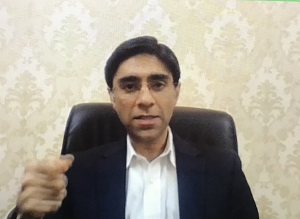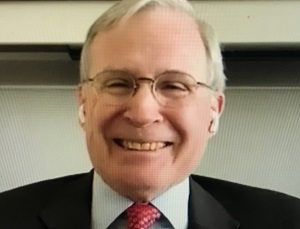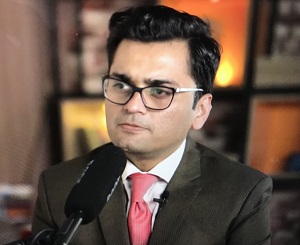Infer Talks with Former NSA Moeed Yusuf and Stephen Hadley
By Elaine Pasquini

Washington: On the April 18, 2023, episode of InferTalks, a digital platform offering news and insights on global issues, research journalist Usama Nizamani spoke with Dr Moeed Yusuf, former national security advisor for Pakistani Prime Minister Imran Khan, and Stephen Hadley, US national security advisor under former President George W. Bush. The one-time NSAs reflected on their past responsibilities, US-Pakistan relations and emerging global issues.

Moeed Yusuf |

Stephen Hadley |

Usama Nizamani |
China and Russia now challenge the international system and have offered their own authoritarianism as an alternative to the Western model of political democracy and market economics, Hadley said. The United States, while still a major player, “relatively is less powerful than it was in 2000,” he opined. “I think the world is a much more changed place. I think greater competition between China and the United States is something that is here to stay, and the question is whether those two countries can develop some guardrails or common principles that allow them to manage that competition so it does not become confrontation or conflict…as we go into what is really a very new era ahead of us.”
Even though the United States is focused on Russia’s invasion of Ukraine, the challenges presented by China and developments in the Middle East, Washington needs to stay involved with Pakistan, Hadley put forth. And, on its part, Pakistan needs to “make clear that it has a much more sophisticated view of South Asia [beyond China] and wants the United States to play a role and wants to have a relationship with the United States,” he insisted.
Going forward, Hadley stressed, the US and Pakistan need to sit down and have a conversation about the nature of their relationship, one that will be “based on more transparency and candor that will reflect the strategic interests the two countries have in each other and can help and assist Pakistan to face the current terrorist challenges it faces, but also the economic challenges it faces.” This is the kind of conversation the two countries need to be having, he argued, but “I think we are not having it today, and I think that is very unfortunate. The United States has a real national security interest…in a secure and safe Pakistan that is able to provide stability, security and a better life for its people.”
Yusuf reflected on his experience as national security advisor when he developed the first-ever national security policy of Pakistan in 2021. The document was the product of a “strategic planning cell” Yusuf created whose job it was to look beyond the horizon and “think big” and determine Pakistan’s direction for the next five to fifteen years, Yusuf explained.
Responding to Nizamani’s question on how the improving relations between Saudi Arabia and Iran might affect Pakistan, Yusuf stated: “As a country that doesn’t want to be part of camp politics and wants peace in the region, build connectivity and have a pivot to geoeconomics, anything that prevents conflict and makes our region more stable is good for Pakistan.”
Whatever opens up Iran – which is internationally isolated – “is good for Pakistan,” he said. But the opening of Iran in terms of the economy must be with “the West on board,” he added. “I hope this is the beginning of a larger conversation where everyone can reach a consensus on how to engage Iran positively.”
Turning to the subject of Afghanistan, Yusuf lamented that Pakistan’s neighboring country is becoming “the forgotten theatre and the forgotten conflict.” According to the World Bank, Afghanistan is on the brink of 97 percent poverty which means a possible collapse of the economy, a major humanitarian disaster and a major outward migration outflow again. “I just can’t see this working out for any of us if we just forget it and let it be,” he warned.
With respect to redefining US-Pakistan relations, a good starting point, he suggested, would be climate change and reduction of poverty, “which are two areas everyone agrees on.”
Economic ties between US and Pakistan would also benefit both countries, Yusuf said. With a population of 230 million, Pakistan does have “an important place in the world, and is a large market,” he emphasized. “I don’t think it is true that American investors don’t want to come to Pakistan. What is true is that if you work with the US to create that sort of space, I think profit is to be made and a number of US companies do make profit in this country.”
Yusuf believes the world is once again “moving decidedly into a great power contestation kind of frame,” and hopes Pakistan can avoid becoming part of that contestation and instead be the country that tries to “help lower the temperature at least in the region.”
“If South Asia heats up, if connectivity suffers, if South Asian countries become proxies in this greater competition, everybody loses, including the US and China,” he warned. “So, for me, in the future of the US-Pakistan relationship the number one rule has to be for Pakistan to convince the US that it is not looking to play camp politics but wants to continue its economic integration with the West while keeping its very, very close relationship with China.”
Yusuf believes Pakistan should bring the US and China together for a conversation on how to lower the temperature in the region. “The US wants it; China wants it; Pakistan wants it, but we just can’t seem to find the way to get that done at the moment,” he said.
None of this, however, can be accomplished unless the US and Pakistan sit down and map out a strategic way forward for the two countries to work together and get beyond just a security or counterterrorism relationship, Yusuf concluded.
(Elaine Pasquini is a freelance journalist. Her reports appear in the Washington Report on Middle East Affairs and Nuze.Ink.)

